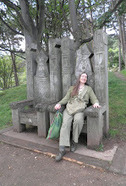Article abstracts typically say little about what the researcher has discovered or what the key findings are, what they are arguing as a ‘bottom line’, or what key ‘take-away points’ they want read...
Research and publish the best content.
Get Started for FREE
Sign up with Facebook Sign up with X
I don't have a Facebook or a X account
Already have an account: Login
Literacy in a digital education world and peripheral issues.
Curated by
Elizabeth E Charles
 Your new post is loading... Your new post is loading...
 Your new post is loading... Your new post is loading...
|
|












